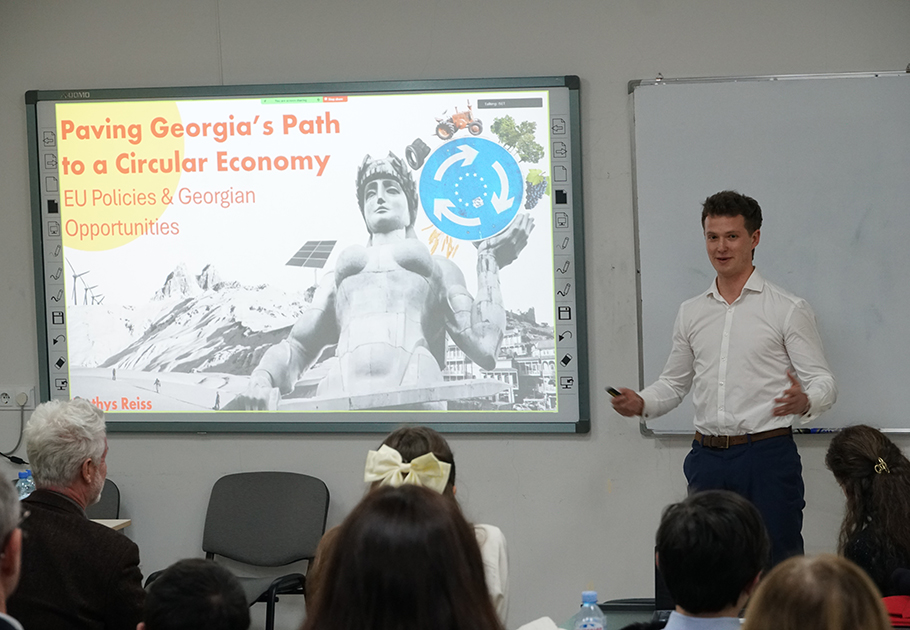
Understanding the Shift: From Linear to Circular Economy in Georgia
The International School of Economics at Tbilisi State University (ISET) recently hosted a pivotal seminar on the circular economy, in collaboration with the French-Georgian University. This event featured Mathys Reiss, a prominent expert in circular economy and sustainable business strategies. The seminar, titled “Paving Georgia’s Path to a Circular Economy: EU Policies & Georgian Opportunities,” attracted a diverse audience of students, academics, and industry professionals eager to delve into the intricacies of sustainable economic development.
The Need for a Circular Economy
Reiss began by dissecting the conventional linear economic model—a system characterized by a “take-make-dispose” approach. He highlighted its inherent limitations and the detrimental environmental consequences it poses. In contrast, he presented the circular economy as a viable alternative—a regenerative system where resources are kept in use for as long as possible, extracting the maximum value from them while in use, then recovering and regenerating products and materials at the end of each service life. This approach minimizes waste and promotes resource efficiency.
Georgia’s Potential in the Circular Economy Transition
The seminar underscored the significant potential for Georgia to embrace the circular economy. By adopting circular practices, Georgia can unlock numerous economic and environmental benefits, including reduced reliance on raw materials, decreased waste generation, and the creation of new green jobs. The European Union’s circular economy policies and their relevance to Georgia’s context were also discussed. Reiss provided insights into how Georgia can leverage EU best practices and funding opportunities to accelerate its transition towards a more sustainable economic model.
Actionable Steps for Georgia
The seminar didn’t just highlight challenges; it offered practical solutions. Reiss presented a roadmap for Georgia, outlining specific steps the country can take to foster a circular economy. These recommendations included:
- Policy Reforms: Implementing supportive policies and regulations that incentivize circular practices.
- Innovation and Technology: Investing in research and development to promote eco-design and resource-efficient technologies.
- Public Awareness: Educating the public about the benefits of circularity and promoting sustainable consumption patterns.
- Collaboration: Fostering collaboration among businesses, government, and academia to drive the transition.
ISET’s Role in Promoting Sustainable Development
ISET’s active involvement in hosting this seminar reflects the institution’s commitment to promoting sustainable development in Georgia. ISET recognizes the crucial role of education and research in driving the shift towards a circular economy. Through its academic programs, research initiatives, and public engagement activities, ISET is contributing to the development of a knowledge-based economy that prioritizes sustainability and environmental stewardship.
Join the Circular Economy Movement
The transition to a circular economy requires collective action. Individuals, businesses, and policymakers all have a part to play in shaping a more sustainable future. By embracing circular principles, Georgia can pave the way for a greener, more resilient economy that benefits both people and the planet.
Continuing the Conversation on Circularity in Georgia
The seminar concluded with a dynamic Q&A session, providing attendees with an opportunity to engage directly with Mathys Reiss and delve deeper into specific aspects of the circular economy. The event served as a valuable platform for knowledge sharing and networking, fostering a sense of collective purpose in advancing Georgia’s sustainability agenda. Future collaborations between ISET and the French-Georgian University promise to further contribute to the ongoing dialogue and action on circular economy in the region.


